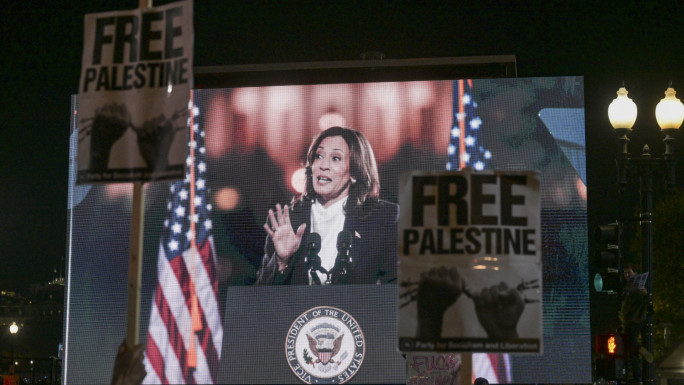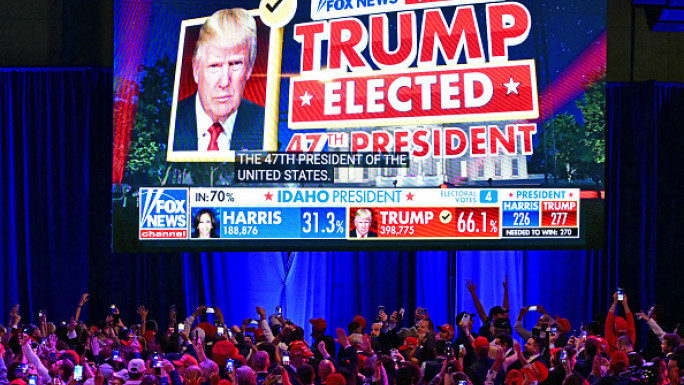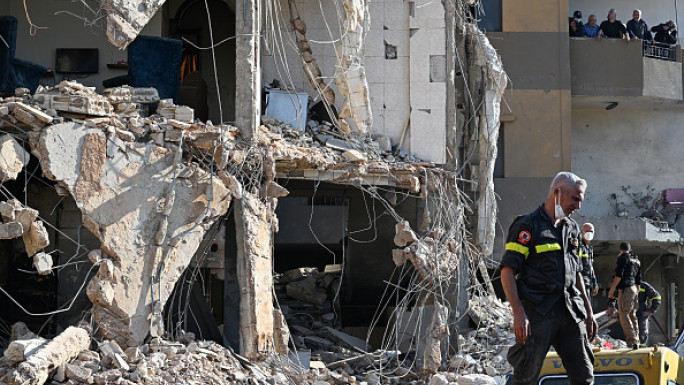
In France, free speech is fine, just don't mention Palestine
In France, free speech is fine, just don't mention Palestine
Comment: For the French establishment, The Voice contestant Mennel was the perfect example of an 'integrated Muslim', until her pro-Palestine stance came into view, writes Malia Bouattia.
5 min read
Mennel went on The Voice hoping to 'open peoples' minds, not narrow them' [Mennel Official/Facebook]
This month, news hit that French singer Mennel Ibtissem was to step down from reality TV show, The Voice France, over her history of tweets in solidarity with Palestinians living under colonial occupation, and her criticism of the French government.
The 22-year old contestant had gained much attention as a hijab-wearing woman of colour - a rarity in general on French television screens, let alone on a show of this nature.
Given the generalised attack on Muslim women in prominent positions, either as political or media personalities, the news is not entirely surprising.
It is now well established that Muslims and People of Colour can dance, sing, and generally entertain white publics, but they are expected to stay in their lane, keep quiet, and smile.
In addition, the alarming rise in Islamophobia in France has meant the continued systematic oppression of Muslims across every section of society, along with what's known as the "colour blindness" approach. This official tactic supposedly ensures that statistics on the basis of race or ethnicity are not collected, so that they cannot be used to discriminatory ends.
But it was only a matter of time before Ibtissem experienced a racist backlash.
The attacks came from all corners. The singer was met with endless harassment on social media, TV roundtables discussing her "case", and even statements from French politicians on national TV demanding her expulsion from the show.
While the focus appeared to be on her social media history, the nature of the debate confirmed what many Muslims - and not just those living in France - already feared: Criticism of her appeared to be based on a more fundamental rejection of a woman that was deemed to contradict the supposed secular, republican values.
A visibly Muslim woman on a mainstream platform, singing in Arabic, English and French, claiming her own space and voice - literally - has become unacceptable in the country of supposed universal human rights.
The fact that the Muslim woman in question dared to hold critical views of the French government in relation to counter-terrorism, domestic and foreign policy, as well as an illegal occupation in the Middle East, made the whole affair even more unbearable for a state that continues to pedal anti-Muslim hatred and legitimise growing far-right nationalist groups.
While the focus appeared to be on her social media history, the nature of the debate confirmed what many Muslims - and not just those living in France - already feared: Criticism of her appeared to be based on a more fundamental rejection of a woman that was deemed to contradict the supposed secular, republican values.
 |
They are expected to stay in their lane, keep quiet and smile |  |
The fact that the Muslim woman in question dared to hold critical views of the French government in relation to counter-terrorism, domestic and foreign policy, as well as an illegal occupation in the Middle East, made the whole affair even more unbearable for a state that continues to pedal anti-Muslim hatred and legitimise growing far-right nationalist groups.
France prides itself on freedom of speech, but the measures its government is willing to enforce in order to censor individuals, are astounding.
Apparently, free speech is a privilege only extended to those who do not partake in conversations surrounding the negative legacies of imperialism, white supremacy and Islamophobia.
Palestine solidarity has long been a target of such state-led repression, with aggressive governmental policies introduced to shut down debate and campaigns in opposition to Israel's activities.
Criminalising the Boycott, Divestment and Sanctions movement has been a key focus, and since 2010 - when a ministerial order was enforced - activists who partake in BDS efforts are being taken to court over accusations of hate speech.
 |
Apparently, free speech is a privilege only extended to those who do not partake in conversations surrounding the negative legacies of imperialism |  |
He offered no nuance, no consideration for the context both within and outside of the Middle East, and certainly no reflection on the French people's long-standing history of boycott action during the anti-apartheid movement, or opposition to nuclear testing.
| Facebook Post |
The attempts of censorship have even included the arrest of an individual who wore a pro-BDS t-shirt during an international women's day demonstration, and the banning of a protest organised by Collectif Palestine 69, to name just a few.
This repression in France is part of an international wave of a government-led shut down of pro-Palestine activism, ranging from UK universities clamping down on Israel Apartheid Week, to US states moving to ban BDS all together.
This process points to a growing reality: While our governments continue to support and profit from the military and political role Israel plays in the Middle East, populations across the world stand with Palestine.
Repression and encroaching on civil liberties can hold movements back for some time, but in the long run it will only highlight the importance of the cause - not only in terms of international solidarity but also in terms of our own civil and political rights at home.
The Indian national movement against the British chanted a slogan that comes to mind here: "First they ignore you, then they laugh at you, then they fight you, then you win."
And indeed, pressure in France continues to build among activists, with writers and academics now more confident to speak out about their opposition to state repression of BDS campaigns.
At the same time, it seems clear that Macron's government will continue to enforce the draconian policies of his predecessors. The question of Palestine then, will continue to play a key structuring role in French politics in the months and years to come.
Read more: Cambridge vs BDS: Standing up to institutional bias
Ironically, just recently the Israeli embassy stated that it is boycotting the opening ceremony of the Israeli Film Festival taking place in Paris, due to the screening of Foxtrot - a film that tells the story of Israeli army soldiers covering up their killing of Palestinian teenagers.
The ambassador is claims the film is "boosting BDS and Israel's enemies".
Many of us are left wondering whether due process will take place, that would - surely - see a court order put in place, given the illegality of boycotting Israel in France?
Or perhaps, in the words of the French renaissance writer, Jean de La Fontaine, in the land of the Enlightenment, "the reason of those best able to have their way, is always the best".
Malia Bouattia is an activist, a former president of the National Union of Students, and co-founder of the Students not Suspects/Educators not Informants Network.
Follow her on Twitter: @MaliaBouattia
Opinions expressed in this article remain those of the author and do not necessarily represent those of The New Arab, its editorial board or staff.





 Follow the Middle East's top stories in English at The New Arab on Google News
Follow the Middle East's top stories in English at The New Arab on Google News


